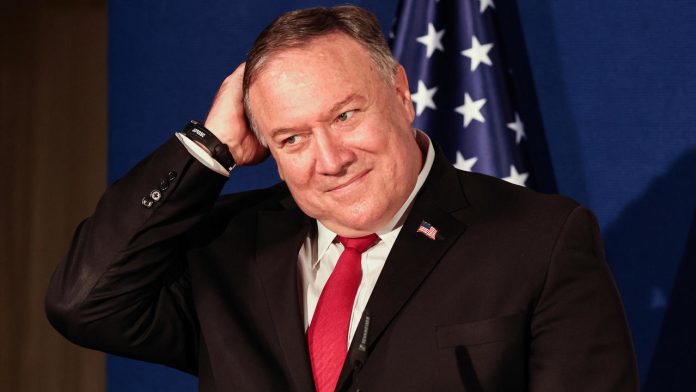China on Thursday fired a parting shot at the Trump administration by announcing unprecedented sanctions against outgoing Cabinet officials and advisers, including former secretary of state Mike Pompeo, as it extended a rhetorical olive branch to newly installed President Biden.
But whether — or how — Biden would respond and seek to repair relations between the world’s two leading powers remains a key unknown in Beijing, where commentators and state media greeted the new U.S. presidency with tepid optimism and some concern.
Referring to Biden’s inauguration as a “new day” for America, Hua Chunying, a Foreign Ministry spokeswoman, called on the Democratic administration to turn the page on the “particularly difficult” past four years and renounce the all-fronts pressure campaign that defined President Donald Trump’s China policy.
“The Trump government, particularly Pompeo, buried too many mines that need to be removed, burned too many bridges that need to be rebuilt,” Hua said in lengthy remarks Thursday as she appealed for a reset. “With joint hard work from both sides, the better angels of U.S.-China relations can defeat evil forces.”
But China’s first act of the Biden era, announcing sanctions against Republicans while Biden’s inauguration ceremony was in full swing at the U.S. Capitol, immediately fell flat. Minutes after Biden became president, the Foreign Ministry announced sanctions against Pompeo, former national security aides Robert C. O’Brien and Matthew Pottinger, and 25 other Americans and their families, who would be prohibited from traveling to China — including Hong Kong and Macao — or conducting business with the country.
The Biden White House criticized the sanctions and called for American unity to compete against China.
“Imposing these sanctions on Inauguration Day is seemingly an attempt to play to partisan divides,” Emily Horne, Biden’s National Security Council spokeswoman, said in a statement Wednesday. “Americans of both parties should criticize this unproductive and cynical move. President Biden looks forward to working with leaders in both parties to position America to out-compete China.”
The tough response follows high-level appointments and statements in recent days that have raised concerns in Beijing about whether the Biden team would in fact reverse course on China policy, as some have hoped.
At his Senate confirmation hearing this week, Antony Blinken, Biden’s nominee for secretary of state, said he agreed with Pompeo’s assessment that Chinese government abuses in the Xinjiang region amounted to “genocide” and added that he believed China poses the greatest threat of any foreign nation to the United States. Avril D. Haines, Biden’s director of national intelligence, said she supported a “more aggressive stance” toward Beijing compared with the period under President Barack Obama.
The Communist Party-controlled Global Times newspaper noted after the inauguration that Biden did not mention China in his speech, nor did he offer signals about whether and how he would seek a thaw with Beijing. In a commentary, the paper expressed concerns about Blinken’s remarks in his confirmation hearing and pointed out that the Biden team invited Taiwan’s envoy to Washington to attend a presidential inauguration for the first time. China claims Taiwan as its territory and objects strenuously to diplomatic interactions between Washington and Taipei.
“American society’s favorable views toward China have indeed declined in the past four years,” the commentary noted as it asked Biden to not succumb to growing anti-China popular sentiment.
Wang Huiyao, president of the Center for China and Globalization and an adviser to China’s State Council, said “structural challenges” between Beijing and Washington will continue, and that Chinese officials were still reeling from Pompeo’s pressure campaign.
“The contradictions will continue to exist, and they will not disappear, but the Biden administration will not be as crazy and irrationally play cards like Trump,” he said. Wang added that it would take time for the distrust to melt away. “If the Biden administration sends more goodwill, then China would also respond more actively.”
Before departing office this month, Pompeo announced a range of measures against China, including the Xinjiang genocide designation and sanctions against Chinese and Hong Kong officials involved in Hong Kong’s national security crackdown. He also lifted State Department restrictions that prevented meetings between U.S. and Taiwanese diplomats.
In its parting shot, China said Thursday its sanctions would also target Peter Navarro, the economic adviser who advocated Trump’s trade war, as well as three former senior officials who expressed support for Taiwan over the past eight months: health and human services secretary Alex Azar; Keith Krach, an undersecretary of state; and the ambassador to the United Nations, Kelly Craft. Azar and Krach flew to Taiwan on official visits; Craft was scheduled to visit, but her flight turned around in midair and she conducted meetings by videoconference instead.
Trump and his family members were not named in the ministry’s statement, but it did name former national security adviser John Bolton, who left the White House amid acrimony in 2019, and former White House strategist Stephen K. Bannon, who was pardoned by Trump this week after being charged with defrauding political donors. The Chinese government declined to disclose most of the 28 names.
Chinese banks are not as central to the global financial system as U.S. banks, so the effects of the Chinese sanctions are probably not as far-reaching as those levied by Washington against Chinese or Beijing-backed officials over Hong Kong and Xinjiang. But Beijing’s announcement could impose real costs on former officials who return to the business world, and they present travel hurdles if any were to return to government service.
Source : Washington Post







